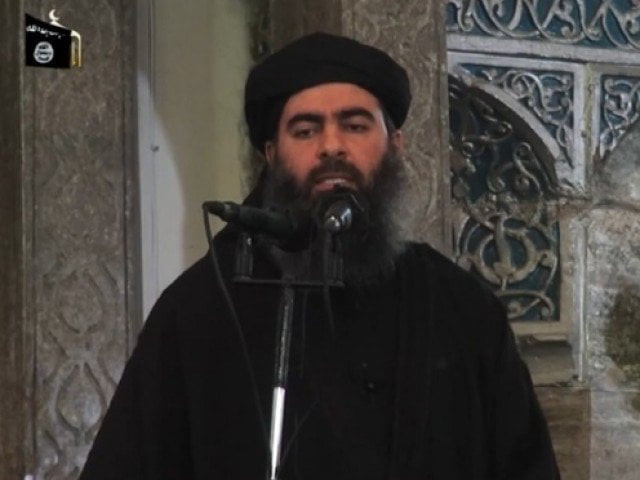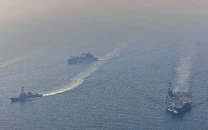Islamic State leader Baghdadi, world's 'most wanted', sought in Syria offensive
There have been recurring reports of Baghdadi being killed or injured

Abu Bakr al-Baghdadi. PHOTO: AFP/FILE
There have been recurring reports of Baghdadi being killed or injured, but the elusive leader, whose only known public appearance dates to July 2014 when he proclaimed a cross-border caliphate from the pulpit of a mosque in the Iraqi city of Mosul, is believed to be still alive.
In August, he resurfaced in a purported new audio recording in which he urged his followers to keep up the fight despite IS having lost around 90 percent of the territory it held at the height of its reign of terror.
He also urged them to continue waging lone-wolf attacks in the West.
IS chief Baghdadi urges 'jihad' in purported new recording
In May, a senior Iraqi intelligence official said that Baghdadi had been moving discreetly between villages and towns east of the Euphrates river in Deir Ezzor province, near the Iraqi border.
He was travelling in a small group of "four or five people" including male relatives, the official said.
Iraqi political commentator Hisham al-Hashemi, an expert on the Sunni extremist group, said his security sources told him Baghdadi was hiding out in the Syrian desert and regularly moved between al-Baaj in northwest Iraq and Hajin in Syria's southeast.
As the caliphate crumbled, Iraqi forces and coalition-backed forces in Syria have killed or captured several IS leaders.
On Wednesday an Iraqi presented as Baghdadi's deputy, Ismail Alwan Salman al-Ithawi, was sentenced to death by a court in Iraq after being apprehended in Turkey and extradited as part of a joint Turkish-Iraqi-US operation.
In May, Iraqi forces claimed to have captured five top IS commanders in a cross-border sting.
The US-backed Kurdish-Arab alliance launched Operation Roundup last week, the third phase of a year-old operation to clear southeastern Syria of its last IS holdouts, in an area around the Euphrates extending around 50 kilometres (30 miles) into Syria.
Iraq court condemns to death 'deputy of Islamic State leader'
"This is the last bastion for Daesh's mercenaries," Zaradasht Kobani, a Kurdish commander with the Kurdish-led Syrian Democratic Forces, said, using an Arabic acronym for the Islamic State.
"We will eliminate them here," he said.
But reeling in Baghdadi will not be simple, said Hassan Hassan, a senior research fellow at the Program on Extremism at the George Washington University in Washington.
"He and his group learned from previous mistakes that led to the killing of the top two leaders in 2010, (al-Baghdadi's predecessor) Abu Omar al-Baghdadi, and his war minister Abu Hamza al-Muhajir," Hassan said.
"This means that only a very few and highly-trusted people know where he is."
The mountains, desert, river valleys and villages of the border area provide "several possible hideouts," Hassan noted.
The anti-IS coalition may be hoping Baghdadi again gives away his whereabouts by mistake, as in November 2016 when Iraqi forces fighting to retake Mosul from IS picked up on a short radio exchange between him and his men.
"He spoke for 45 seconds and then his guards took the radio from him," a senior Kurdish official who heard the call told Britain's Guardian newspaper, which revealed the near-miss in January.
"They realised what he had done," the official added, saying the call was traced to a village west of Mosul.
Islamic State claims attack on Afghan midwife center
If Baghdadi does manage to outfox the coalition, he could join one of IS's underground cells in Iraq or Syria.
Al-Hashemi estimates that around 2,000 IS extremists are still active in Iraq and around 3,000 in eastern Syria, a large proportion of them foreigners.
He believes Operation Roundup could drive hundreds of fighters back across the border into Iraq.
Iraq declared "victory" over IS in December 2017 after a three-year war against the extremists, who once controlled nearly a third of the country.
But sleeper cells continue to stage attacks from sparsely populated areas.



















COMMENTS
Comments are moderated and generally will be posted if they are on-topic and not abusive.
For more information, please see our Comments FAQ